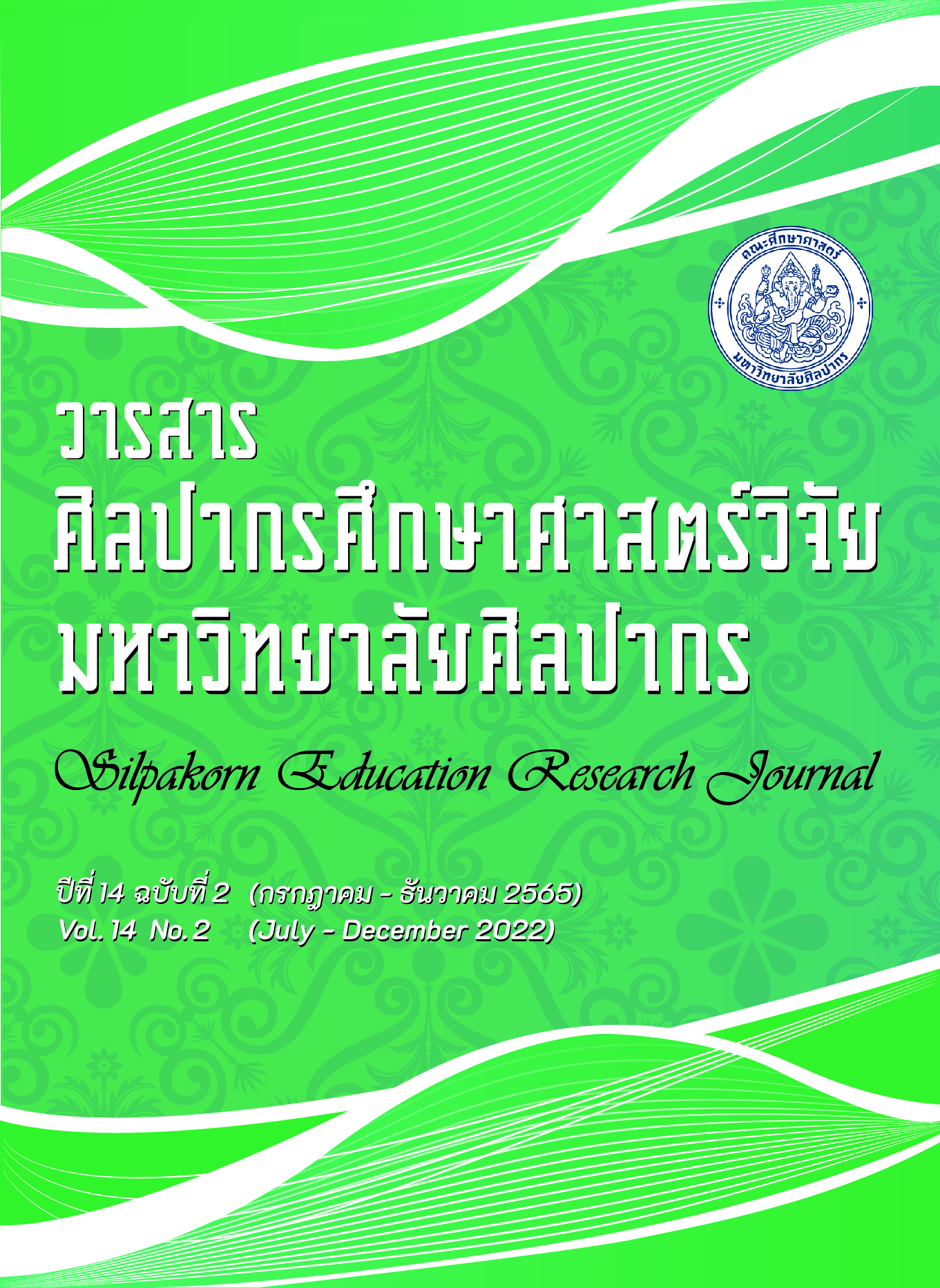การประเมินหลักสูตรศึกษาศาสตรมหาบัณฑิต สาขาวิชาพัฒนศึกษา (หลักสูตรปรับปรุง พ.ศ. 2561) คณะศึกษาศาสตร์ มหาวิทยาลัยศิลปากร
คำสำคัญ:
การประเมินหลักสูตร, พัฒนศึกษา, มหาบัณฑิตบทคัดย่อ
การวิจัยนี้มีวัตถุประสงค์เพื่อประเมินหลักสูตรศึกษาศาสตรมหาบัณฑิต สาขาวิชาพัฒนศึกษาโดยใช้การประเมินแบบ CIPP กลุ่มเป้าหมายในการวิจัยเชิงปริมาณ ประกอบด้วย กรรมการบริหารหลักสูตร 5 คน นักศึกษาปัจจุบัน 10 คน และศิษย์เก่า 10 คน และกลุ่มเป้าหมายในการวิจัยเชิงคุณภาพ ประกอบด้วย กรรมการบริหารหลักสูตร 5 คน อาจารย์พิเศษ 2 คน ศิษย์เก่า 3 คน และผู้ใช้บัณฑิต 2 คน เครื่องมือที่ใช้คือ แบบสอบถามและแนวทางการสัมภาษณ์ระดับลึก และการวิเคราะห์ข้อมูลโดยใช้ความถี่ ร้อยละ ค่าเฉลี่ย และส่วนเบี่ยงเบนมาตรฐาน และการวิเคราะห์เนื้อหา
ผลการประเมินหลักสูตร พบว่า 1. ด้านบริบท คณะกรรมการบริหารหลักสูตร และนักศึกษาปัจจุบัน ประเมินความเหมาะสมในระดับมาก (M=4.31, 4.16) ส่วนศิษย์เก่าประเมินความเหมาะสมในระดับมากที่สุด (M=4.60) 2. ด้านปัจจัยนำเข้า กลุ่มเป้าหมายทุกกลุ่มประเมินความเหมาะสมในระดับมาก (M=4.39, 4.20, 4.37) 3. ด้านกระบวนการ คณะกรรมการบริหารหลักสูตรและศิษย์เก่าประเมินความเหมาะสมในระดับมากที่สุด (M=4.56, 4.63) ส่วนนักศึกษาปัจจุบันประเมินความเหมาะสมในระดับมาก (M=4.26) และ 4. ด้านผลผลิต คณะกรรมการบริหารหลักสูตรประเมินความเหมาะสมในระดับมาก (M=4.35) ส่วนศิษย์เก่าประเมินความเหมาะสมในระดับมากที่สุด (M=4.55) 5. แนวทางการพัฒนาหลักสูตร ประกอบด้วย 5.1 การสื่อสารวัตถุประสงค์ของหลักสูตรให้ตรงกับกลุ่มเป้าหมาย 5.2 การสร้างความมีส่วนร่วมในการบริหารจัดการและการพัฒนาหลักสูตรเพื่อประโยชน์ของผู้เรียน 5.3 การจัดการเรียนการสอนที่เน้นกิจกรรมเชิงปฏิบัติการ 5.4 การพัฒนาทักษะภาษาต่างประเทศและจริยธรรมการวิจัย
เอกสารอ้างอิง
Chantaranamchoo, N. (2020). Development Education: Diversity of Paradigms for Sustainable
Development. Bangkok: Wattana Panich. (in Thai)
_______. (2021). Quantitative Methods for Social Sciences Research. Bangkok: Wattana Panich.
(in Thai)
Faculty of Education, Silpakorn University. (2013). Master of Education Degree in Development Education. (Revised 2561 B.E.). [Online]. Retrieved August 29, 2017, from http://www.graduate.su.ac.th/images/course/2563/29.pdf. (in Thai)
Gratthorn, A. A., Boschee, F., Whitehead, B. M., and Boschee, B. F. (2019). Curriculum Leadership: Strategies for Development and Implementation. 5th ed. Thousand Oaks: SAGE Publications.
Heemadam, F. (2018). “The Curriculum Evaluation on Master of Education in Research and Evaluation Apply to Criteria of ASEAN University Network Quality Assurance (AUN –QA) at Program Level”. Al-Hikmah Journal of Fatoni University 8(15): 77-99. (in Thai)
International Bureau of Education. (2021). Curriculum Evaluation. [Online]. Retrieved June 31, 2021, from http://www.ibe.unesco.org/en/glossary-curriculum-
terminology/c/curriculum-evaluation.
Irish Aid. (2017). What is Development Education?. [Online]. Retrieved October 2, 2017, from https://www.irishaid.ie/what-we-do/who-we-work-with/civil-society/development-education-funding/.
Kelly, A. V. (2004). The Curriculum Theory and Practice. 5th ed. Thousand Oaks: SAGE Publications.
Neawheangtham, R., Kheovichai, K., Veranavin, L., and Sukjairungwattana, T. (2017). “The Curricula Evaluation of Master of Education Majoring in Development Education Faculty of Education Silpakorn University”. Veridian E-Journal Silpakorn University 10(3): 2234-2249. (in Thai)
Regan, C. (2006). Irish Aid and Development Education: Describing, Understanding, Challenging-the Story of Human Development in Today’ s World. Dublin: Irish Aid.
Rhode Island Department of Education. (2021). Curriculum Definition. [Online]. Retrieved June 19, 2021, from https://www.ride.ri.gov/InstructionAssessment/Curriculum/
CurriculumDefinition.aspx.
Rukspollmuang, C. (2004). Paradigms of Development Education. Bangkok: Winyoochon. (in Thai)
Soonthornthai, W. (2008). “The Reasons Behind the Development of The 5-level Decision Threshold”. Executive Journal 28(3): 97-101. (in Thai)
Stufflebeam, D. L. (2003). “The CIPP Model for Evaluation. In Stufflebeam, D. L. and Kellaghan, T. (Eds.)”. The International Handbook of Educational Evaluation (Chapter 2). Boston: Kluwer Academic Publishers.
Unaromlert, T., Weeranawin, L., Chanpla, C., and Suksai, S. (2009). “Curriculum Evaluation of Master of Education in Development Education Faculty of Education, Silpakorn University”. Silpakorn Educational Research Journal 1(1): 22-33. (in Thai)
Unaromlert, T., Paiwithayasiritham, C., Weeranawin, L., and Suphannopap, P. (2012). “Curriculum Evaluation of Doctor of Philosophy in Development Education, Faculty of Education Silpakorn University”. Journal of Education Silpakorn University 10(1): 75-90. (in Thai)
Wiles, J. (2009). Leading Curriculum Development. Thousand Oaks: Corwin Press.
Wongnaya, S., and Chaoweeratiphong, T. (2017). “An Evaluation of Doctoral Degree in Administration and Development Strategy Curriculum (Revised 2013), Kamphaeng Phet Rajabhat University”. The Golden Teak : Humanity and Social Science Journal (GTHJ.) 23(2): 62-70. (in Thai)





